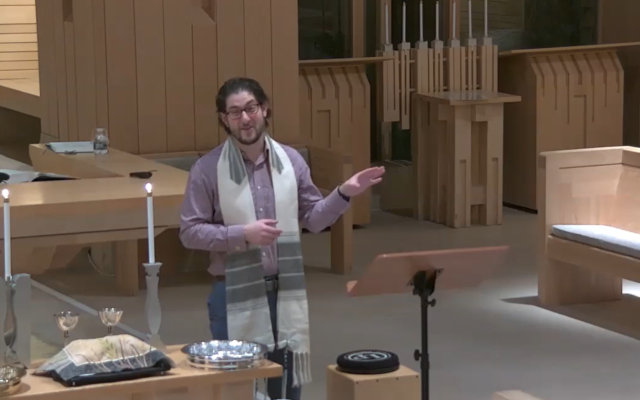Rabbi ‘plagiarizes’ AI sermon but says humans aren’t obsolete yet
NY’s Joshua Franklin delivers speech generated by ChatGPT linking story of biblical Joseph with vulnerability; congregants clap but he seeks to underline technology’s soullessness
 |
| Rabbi Joshua Franklin of the Jewish Center of the Hamptons, in New York, giving a sermon on the role of artificial intelligence in a video uploaded on January 1, 2023. |
A US rabbi recently delivered a sermon composed by the artificial intelligence engine ChatGPT in a bid to highlight that the quickly evolving technology has yet to develop emotions, and is therefore incapable of replacing humans.
Rabbi Joshua Franklin, of the Jewish Center of the Hamptons, asked his congregation to guess where he stole the oration linking the idea of vulnerability and intimacy to the Torah portion of Vayigash — in which the biblical figure Joseph reveals himself to his brothers and reunites with his father, Jacob.
“Despite the hardships that he has endured, Joseph is able to find in his heart the ability to forgive his brothers for their past wrongdoings,” Franklin said in the copied speech uploaded on January 1. “By approaching them with openness and vulnerability, he is able to heal old wounds and to create deeper, more meaningful bonds with his siblings.”
In the borrowed sermon, Franklin emphasized the importance of intimacy in building relationships, and described vulnerability as “the willingness to show up, and be seen when we have no control over the outcome,” quoting Prof. Brene Brown, known for her research on the subject.
“May we be blessed with the courage and strength to be open and vulnerable,” the Rabbi concluded his sermon, then asked the crowd to guess who wrote it.
After a few incorrect answers, Franklin revealed that the “author” was ChatGPT, an advanced chatbot that can mimic human conversation and that has recently become wildly popular.
Freely available online, the program is part of a new generation of AI systems that can converse, generate readable text on demand, and even produce novel images and videos based on what they’ve learned from a vast database of digital books, online writings, and other media.
As with similar systems, ChatGPT can generate convincing prose, but that doesn’t mean what it says is factual or logical. Many school districts are still scrambling to figure out how to set policies on if and how it can be used.
“I gave it a prompt, I said write the sermon, in a voice of a rabbi, of about 1,000 words, connecting the Torah portion this week, Vayigash, to the idea of intimacy and vulnerability, and quote Brene Brown,” Franklin explained, to the astonishment of the congregants.
“Now, you’re clapping, I’m deathly afraid,” Franklin said, adding, “I thought truck drivers were gonna go long before the rabbi, in terms of losing our positions to artificial intelligence and self-driving vehicles.”
“ChatGPT might be really great at sounding intelligent, but the question is, can it be empathetic?” he posed, asserting that the system was incapable of empathy and noting that it could create antisemitic material because of the unlimited sources it could draw from on the internet.
Franklin went on to question the role of rabbis and spirituality in a world “that is driven by data and driven by information,” and concluded that their job may not be so easily usurped.
While AI may be smart, it does not have a soul, Franklin said; it has yet to develop compassion, love, and empathy, and is unable to build community and relationships.
“Those are the things that bring us together,” Franklin concluded and vowed it would be the last time he “plagiarizes” a sermon.
WATCH THE VIDEO: CLOSE YOUR EYES AND THINK AGUDAH CONVENTION SPEAKERS:
Adjective
artificial (comparative more artificial, superlative most artificial)
- Insincere; fake, forced or feigned.
- Not natural or normal: imposed arbitrarily or without regard to the specifics or normal circumstances of a person, a situation, etc.


